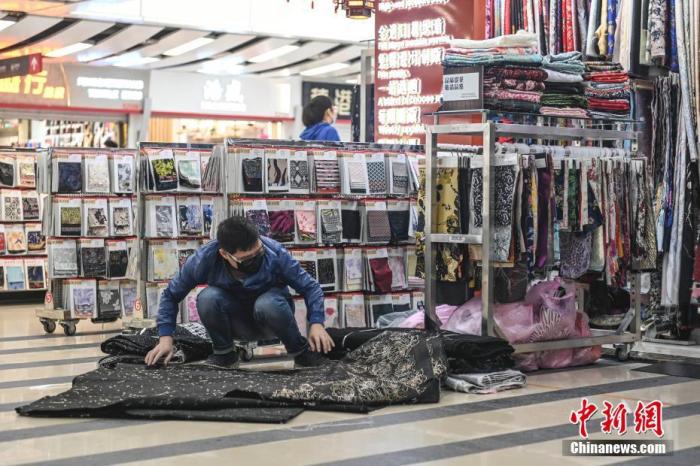Guangzhou International Textile City officially resumed business, and the reworkers organized the goods. Photo by Chen Xin, reporter from China News Agency
(Combating new crown pneumonia) China's economic war "epidemic" record: Chief Economist looks forward to China's economy in 2020
China News Agency, Beijing, March 11 (Reporter Chen Su) 2020 is destined to be an extraordinary year for China. Not only is China hit by the "black swan" of the new crown pneumonia epidemic, it is also facing a well-off society and a decisive battle Decided to overcome the hard task of fighting poverty. In 2020, can China's economy highlight the siege and achieve its set goals? Several chief economists analyzed and looked forward to this.
Shao Yu, chief economist of Orient Securities, believes that the epidemic has affected China's cultural tourism, film and entertainment, catering, transportation, real estate and other industries. The shutdown of many factories has been extended after the Spring Festival this year, and the epidemic situation is expected to affect the production progress of related manufacturing industries at least in the first quarter of this year.
Cheng Shi, the chief economist of ICBC International, said that although the epidemic has brought about the resumption of labor pressure and the impact of industrial chain blockage on the Chinese economy, the war epidemic has also created opportunities for the emergence of emerging industries and made supply-side structural reforms. Accelerate. The outbreak has exposed some shortcomings of China's current economic society, and has also condensed important social consensuses such as further deepening reform and opening up, "squeezing water" on the supply side, and the accelerated rise of hard-core technology.
Shao Yu said that the epidemic brought a “home economy”, which has led to rapid growth in online entertainment, online education, remote office, and online retail. It is expected that the online retail sales growth rate will rebound to about 30% in the first quarter of 2020, accounting for the same period The proportion of total retail sales of consumer goods will also climb to 30%.
What is the impact of the epidemic on China's economy? Will China's economy be stable and far-reaching in 2020? Bank of Communications chief economist Lian Ping said that the impact of the new crown pneumonia epidemic on the Chinese economy is mainly short-term. The endogenous resilience and counter-cyclical macroeconomic policies of the Chinese economy will work together to support and ensure that the Chinese economy achieves its stated goals in 2020.
Ren Zeping, chief economist of Evergrande Group, also believes that the current global epidemic and the collapse of crude oil are mostly short-term effects. As domestic companies resume work and many measures are successfully implemented, the Chinese economy will return to the normal development channel.
Zhu Jianfang, chief economist of CITIC Securities, said that starting from February 23, some provinces have begun to reduce emergency response levels, reflecting the increased efforts in these regions to promote resumption of work and production. March is a period of rapid recovery of the national economy.
Regarding the impact of consumption, Lian Ping said that the online economy will offset the negative impact of the epidemic on consumption to a certain extent. In addition, consumption may rebound rapidly after the epidemic.
Regarding the global epidemic risk, Zhu Jianfang believes that for the Chinese economy this year, the determining variable is domestic demand rather than external demand, and the impact of the spread of overseas epidemics on the Chinese economy is basically controllable.
According to Li Qilin, chief economist of Yuekai Securities, from a macro perspective, China has ample policy space. Compared with other global economies, China's biggest advantage lies in its ability to control the epidemic, and has room for policy support and overall demand expansion. The deployment on the "new infrastructure" illustrates this. (Finish)

